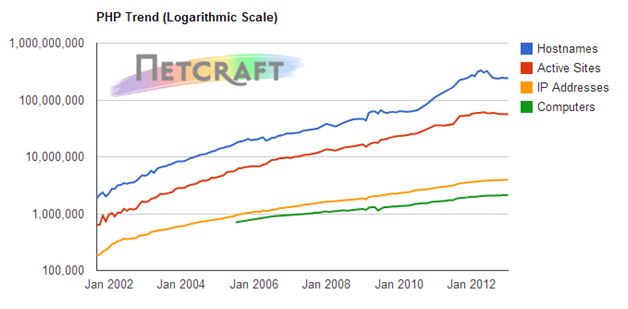In this post guest author John Pitt,is a blogger cum php developer for a leading PHP web development company which offers Offshore PHP Developers for hire. He provides concrete information about PHP, .Net/Java apps development, software development & mobile applications development.We are going to look at PHP touches the 200 Million Mark. Now over to John.
Out with the old, in with the new- that is how things work in the tech arena. With times unfolding, old technologies either make headway in their feature offerings or pave the way for their newer kin. Every established technology is at the crossroads when nascent technological breakthroughs are introduced in the marketplace, and PHP is no different. Ever since its inception in the ‘90s, the programming language has been poised with survival challenges time and again. Whether it’s the ASP.Net, Java or HTML, none has missed out on opportunities to give PHP a rough time. But PHP has been fixed in its ways. The popular web development language has never kneeled down. Its popularity is intact, rather, increasing with every passing day. And now we even have stats to support that!
Yes! It’s 200 Million +
A recent report from Netcraft made it official! As of January 2013, the tally of PHP sites on the web has touched a staggering 244 million! Well, this accounts for 40% of the total 630 million sites operating on the web.

Tracking PHP down the Lane
Personal Homepage Tools, the first version of PHP was released in 1995 by Rasmus Lerdorf. Going by today’s standards php-108.tar.gz might appear Lilliputian, yet it proficiently supported implementation of guest books and other form-based applications. You can still have a glimpse of this PHP web development prototype, which is available for download at museum.php.net.
1997 witnessed the release of PHP 2 with improved speed and additional support for cookie-handling, accessing database and user-defined functions. The very next year, almost 1% of the sites on World Wide Web were using PHP.
With the introduction of PHP 3 in the marketplace, the foundation of present day PHP framework was laid. As this version came out in 1998, the success of the scripting language increased fourfold. The easy extension of language lured dozens of developers and variety of modules flowed in.
Performance challenges still persisted. So, Zeev Suraski and Andi Gutmans implemented changes in the language’s core. The Zend Engine finally evolved and served as the driving force for PHP 4 which was released in 2000. While rendering enhanced performance, PHP 4 was compatible with more web servers, supported output buffering and HTTP Sessions.
By September 2001, Netcraft reported 1.8 million sites operating over the web.
PHP 5, which was developed in 2004, remains the most recent version of PHP technology available in the marketplace, with Zend 2.0 at its core.
And now, PHP has officially reached the 200 million mark. The Netcraft survey report released in January 2013, mentions a remarkable 244 million sites that are running on PHP. This is 39% of all the sites registered with Netcraft’s Web Server Survey.
Some of the popular web applications utilizing PHP include open source content management systems like Drupal, WordPress and Joomla, plus some well-known e-commerce solutions such as OsCommerce, ZenCart and Magento
And now, PHP has officially reached the 200 million mark. The Netcraft survey report released in January 2013, mentions a remarkable 244 million sites that are running on PHP. This is 39% of all the sites registered with Netcraft’s Web Server Survey.
This contributes to the overwhelming response for PHP. Since all major CMS solutions are supported by PHP, the magic of the programming language is not fading anytime soon, especially as the use of CMS grows exceedingly.
So, this goes out to all the aspiring web developers out there. If you thought PHP was an old school technology, think again! PHP has registered tremendous growth over the decades. So, don’t give in to the hype around any other emerging technology. Have a grounded understanding of PHP core and you are sure to enjoy the company of nearly half of the web.
PHP web development is ruling the roost and will continue to do so. For those who haven’t ventured into this avenue yet, it’ time to make a calling.
Thanks for reading and feel free to share your thoughts! Don’t Forget to Follow us on Twitter or Subscribe us to Get the Latest Updates.
















